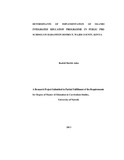| dc.contributor.author | Rashid, Sheikh A | |
| dc.date.accessioned | 2013-08-29T12:59:46Z | |
| dc.date.issued | 2013 | |
| dc.identifier.citation | Rashid Sheikh Aden. (2013). Determinants Of Implementation Of Islamic Integrated Education Programme In Public Preschools In Habaswein District, Wajir County, Kenya. A Research Project Submitted in Partial Fulfillment of the Requirements for Degree of Master of Education in Curriculum Studies, University of Nairobi. | en |
| dc.identifier.uri | http://erepository.uonbi.ac.ke:8080/xmlui/handle/123456789/56315 | |
| dc.description.abstract | This study aimed at investigating the factors that determine implementation of
Islamic Integrated Education Programme in the public early childhood centres
in Habaswein district. Five research questions were formulated to guide the
study. The objectives included establishing the level of monitoring of the IIEP
by the education officers; examining the preschool teachers’ preparedness in
IIEP implementation; assessing the level of support offered by parents as well
as non-governmental organizations towards IIEP implementation and
establishing whether the availability of relevant teaching and learning
materials influence the implementation of IIEP. The study adopted the
descriptive survey design to find out factors that influence effective
implementation of Islamic Integrated Education Programme (IIEP). The
sample comprised of two DICECE trainers, 15 head teachers, 15 preschool
teachers and 75 parents. Thus, a total number of 107 respondents participated
in the study. The data for this study were collected using questionnaires,
interview schedules, and observation checklist. Data were analyzed by use of
qualitative and quantitative techniques. Findings indicated that the level of
monitoring of Islamic Integrated Education Programme by Education Officers
influenced the implementation of IIEP in the public early childhood centres in
Habaswein district. Half of the trainers rated the implementation in the district
being poor while the same number said the implementation was fair. The data
shows that parents’ support had a positive influence on the implementation of
Islamic Integrated Education Programme in the public early childhood centres.
The study also revealed that availability of relevant instructional materials
influenced the implementation of IIEP positively. Findings also revealed that
the level of support by Non-governmental Organizations (NGOs) influenced
the IIEP implementation. It was also concluded that preschool teacher
preparedness had a positive influence on the implementation of IIEP. For
example teachers who have undergone IIEP training implemented the
programme in their classes.
The study recommended that the Ministry of Education should set clear
methods and frequencies of monitoring of Islamic Integrated Education
Programme. There should be proper training for the preschool teachers so that
they can effectively implement the IIEP. Parents should be encouraged to
participate in the running of the programme for successful implementation of
IIEP. The government and other agents involved in the IIEP should provide
adequate instructional materials and equipment for effective implementation
of IIEP. The study suggested that a study on the effectiveness of government
policy on the implementation of IIEP programme in the country should be
conducted. A study on the influence of IIEP on pupil access to education in
the areas covered by the programme should also be conducted and finally a
study on the influence of community participation on IIEP implementation
should be conducted. | en |
| dc.language.iso | en | en |
| dc.publisher | University of Nairobi, | en |
| dc.title | Determinants of implementation of islamic integrated education programme in public preschools in Habaswein District, Wajir County, Kenya | en |
| dc.type | Thesis | en |
| local.publisher | School of Education | en |

